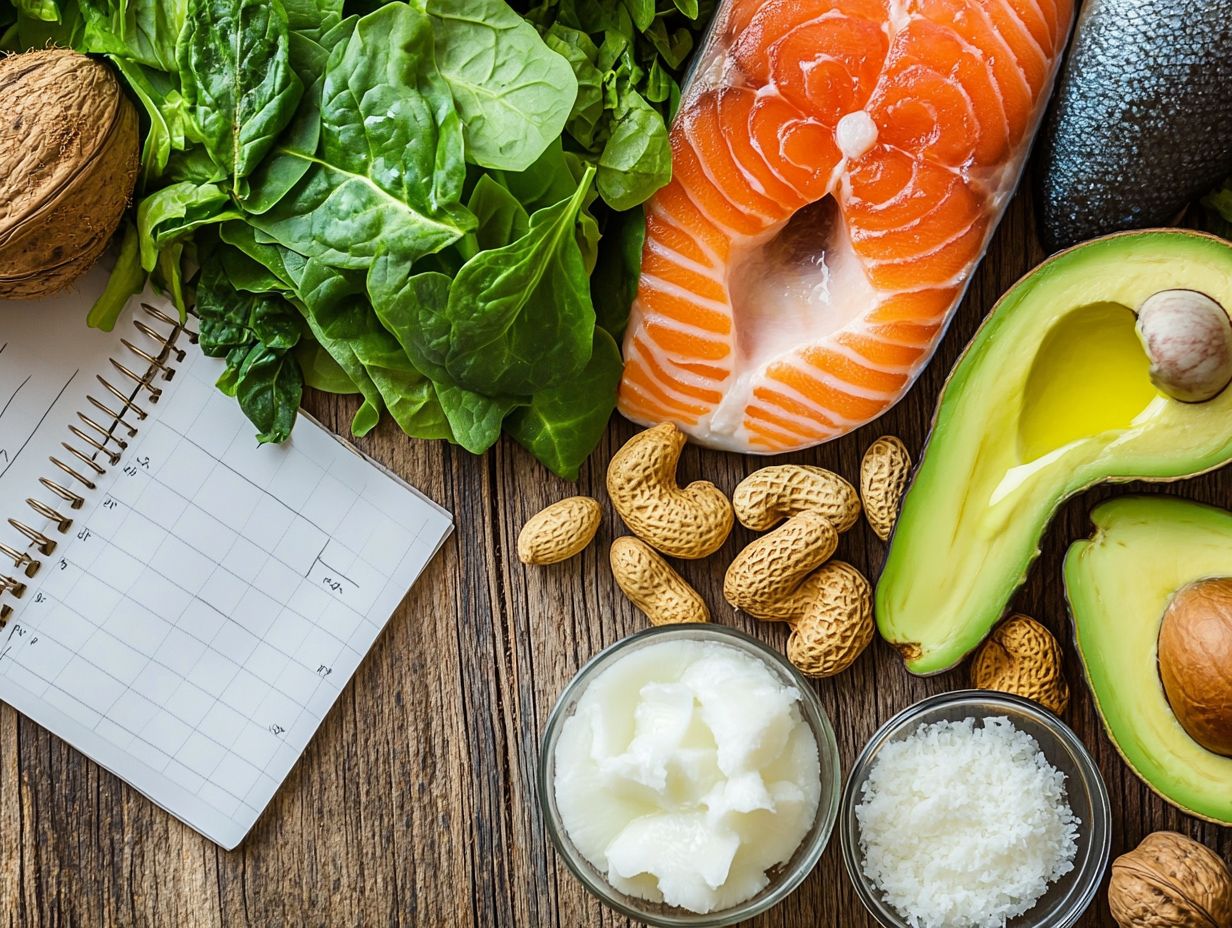The Role of Nutrition in Long-term Keto Success
The ketogenic diet has become immensely popular, celebrated for its potential to promote weight loss and enhance your overall health, with notable short-term benefits and long-term effects. Join us as we explore how you can optimize your keto journey for lasting benefits!
To achieve long-term success on this low-carb eating plan, you ll need more than just a simple reduction in carbohydrate intake. Proper nutrition is vital for maintaining your energy levels and steering clear of deficiencies, especially given the impact on insulin levels and overall metabolic rate.
This article delves into the essentials of the keto diet, highlighting key nutrients, the importance of tracking both macros and micros, recommended supplements, and practical tips for sustaining a well-rounded diet. We will also touch on diet plans such as the Atkins diet, Paleo diet, South Beach diet, and Dukan diet for comparative insights.
Start optimizing your keto journey today for lasting benefits, including better appetite control and improved body composition!
Contents
- Key Takeaways:
- The Basics of Keto Diet
- Why is Nutrition Important for Long-term Keto Success?
- The Importance of Tracking Macros and Micros
- The Role of Supplements in a Keto Diet
- What Supplements are Recommended for a Keto Diet or Similar Diets?
- How to Choose High-Quality Supplements?
- Are Supplements Necessary for a Successful Keto Diet?
- Common Nutrient Deficiencies on a Keto Diet
- Tips for Maintaining Proper Nutrition on a Keto Diet
- Frequently Asked Questions
- What is the role of nutrition in long-term keto success?
- How does a proper nutrition plan affect long-term keto success?
- What are the key macronutrients to focus on for long-term keto success?
- Is it important to track nutrients in a long-term keto diet?
- How can proper nutrition help with long-term keto success?
- Are there any potential challenges with maintaining proper nutrition on a long-term keto diet?
Key Takeaways:

- Proper nutrition is crucial for long-term success on a keto diet.
- Tracking macros and micros and incorporating nutrient-dense foods are essential for maintaining nutrient balance on a keto diet.
- Supplements may be necessary to fill nutrient gaps and prevent deficiencies on a keto diet, but should be chosen carefully and used in conjunction with a healthy diet especially relevant for those managing medical conditions like diabetes, epilepsy, or polycystic ovary syndrome.
The Basics of Keto Diet
The ketogenic diet, often referred to as the keto diet, is a low-carbohydrate, high-fat dietary approach designed to shift your body s metabolism from burning carbohydrates to utilizing fat. This transition promotes weight loss through a process called nutritional ketosis.
By dramatically cutting back on carbohydrates and replacing them with fats, your body enters a state where it efficiently burns fat for energy.
This process leads to the production of ketone bodies, which serve as an alternative energy source. This shift in metabolism can also stabilize insulin levels and reduce the risk of metabolic syndrome.
Embracing this dietary plan may offer a range of health benefits, including better appetite control, an enhanced metabolic rate, and even potential management of certain medical conditions such as Alzheimer s disease and cardiovascular disease.
Why is Nutrition Important for Long-term Keto Success?
Recognizing the significance of nutrition is essential for achieving lasting success on the ketogenic diet. A well-balanced approach to low-carbohydrate, high-fat eating can greatly impact your weight loss journey, overall wellness, and metabolic health.
By making thoughtful nutritional choices, you can meet your caloric needs while fully enjoying the benefits of ketosis, leading to enhanced body composition and heightened energy levels.
Paying attention to nutrient density allows you to sidestep common pitfalls and deficiencies that often accompany restrictive diets.
What Nutrients are Essential for a Keto Diet?
A successful ketogenic diet demands your careful attention to essential nutrients, emphasizing the delicate balance of fats, proteins, and a minimal amount of carbohydrates to trigger that coveted metabolic shift into ketosis. You’ll want to focus on healthy fats from sources like avocados and nuts.
Ensure you get adequate protein from quality meats and dairy, and include a variety of vitamins and minerals to support your overall health and prevent deficiencies.
Grasping the significance of these essential nutrients empowers you to create a diet plan that not only induces ketosis but also enhances your bodily functions, keeping you clear of issues like ketoacidosis.
If you re embracing this dietary approach, prioritizing monounsaturated and polyunsaturated fats is key think olive oil and fatty fish as your go-to options. Your protein should come from top-notch sources, like grass-fed beef and free-range poultry, guaranteeing that your body receives the amino acids it craves for muscle repair and growth.
While you keep carbohydrates low, don t overlook the importance of fibrous vegetables. They provide essential micronutrients like potassium and magnesium, which can help mitigate any potential side effects during your keto transition, such as those related to electrolyte imbalances.
A well-rounded selection of foods not only adds delicious variety to your meals but also ensures you meet your nutritional needs. This paves the way for long-term adherence and a wealth of holistic health benefits, including the prevention of obesity and the maintenance of healthy high-density lipoprotein (HDL) and low-density lipoprotein (LDL) levels.
How to Maintain Proper Nutrient Balance on a Keto Diet?
Maintaining a proper nutrient balance on a ketogenic diet is vital for ensuring your body receives the essential vitamins and minerals it needs while staying within low-carbohydrate guidelines. With careful meal planning and thoughtful food choices, you can achieve this balance.
By incorporating a variety of nutrient-dense foods, you not only meet your dietary needs but also enjoy the numerous benefits of a high-fat, low-carb lifestyle.
Also, evaluate your food intake regularly and adjust as necessary to maintain a healthy balance of macronutrients and micronutrients.
Meal planning is your best ally in this journey, allowing you to strategically choose whole foods over processed options, thus maximizing nutritional content. For instance, rather than opting for pre-packaged snacks, reaching for raw nuts, avocados, and leafy greens can significantly enhance your intake of essential nutrients.
Being mindful of portion sizes is also important; it helps you avoid overindulgence and ensures your body gets the right amount of nutrients without excess calories.
It’s crucial to remember that everyone’s dietary requirements can vary based on factors like activity levels, health conditions, and personal preferences. Tailoring your ketogenic approach to fit your unique needs, possibly with guidance from resources like the University of Texas Health Science Center, can greatly enhance your overall well-being.
The Importance of Tracking Macros and Micros
Tracking your macros (macronutrients) and micros (micronutrients) is essential when you’re navigating a ketogenic diet. This practice fosters a keen awareness of your nutrition and gives you the power to effectively reach your dietary goals.
By keeping an eye on your intake of fats, proteins, and carbohydrates, you can ensure that your consumption aligns with the recommended ratios needed to maintain ketosis. Simultaneously, it s crucial to focus on vitamins and minerals to ward off any potential deficiencies.
This structured method not only elevates the overall quality of your diet but also supports long-term adherence and successful weight management.
What are Macros and Micros?

Macros and micros are the two crucial nutrient categories that play a vital role in your dietary health. Macronutrients include carbohydrates, proteins, and fats, while micronutrients consist of the essential vitamins and minerals your body requires to function optimally. Understanding these nutrients can help you avoid common pitfalls associated with low-carbohydrate diets.
Regarding the ketogenic diet, your primary focus should be on balancing your macros to maintain a low-carb, high-fat approach, allowing your body to enter the state of nutritional ketosis. Meanwhile, paying attention to your micros ensures you meet your energy needs while also supporting your overall health and wellness.
Grasping the unique roles of macros and micros can significantly elevate your dietary choices. Macronutrients serve as your main energy sources; on a keto diet, you ll typically reduce carbohydrates in favor of fats, which become your primary fuel source. This strategic shift encourages your body to tap into fat stores for energy rather than relying on sugar.
On the other hand, micronutrients are critical for regulating metabolic processes, bolstering immune function, and maintaining bone health. Lacking essential micronutrients like potassium or magnesium can impede your performance and overall health, particularly if you re following a more restrictive eating plan, which is why choosing the right supplements can be crucial.
Therefore, striking a balance between macros and micros is key to achieving optimal health outcomes as you navigate the ketogenic lifestyle.
How to Track Macros and Micros on a Keto Diet?
Tracking your macros and micros while on a ketogenic diet can be a breeze when you utilize meal tracking apps and dietary analysis tools. These handy resources help you monitor your food intake and ensure you re sticking to your nutritional goals.
By logging your meals and snacks, you gain valuable insights into your ratios of fats, proteins, and carbs and your micronutrient consumption. This practice holds you accountable and helps you pinpoint patterns and areas for improvement in your eating habits.
Among the plethora of tracking apps available, MyFitnessPal and Cronometer truly shine with their user-friendly interfaces. Their extensive food databases make accurate meal logging a cinch.
To further elevate your tracking game, consider incorporating techniques like meal prepping and using a food scale this will ensure precision in your macro and micronutrient intake.
Remember, consistency is key; by regularly tracking your dietary intake, you can easily make adjustments based on your personal goals, whether that s shedding pounds or maintaining your energy levels.
As you analyze the data you ve recorded, you ll be able to identify trends and make necessary tweaks to portion sizes or meal choices, allowing you to better align with your dietary objectives.
The Role of Supplements in a Keto Diet
Supplements can significantly enhance your ketogenic diet, particularly if you find yourself facing nutrient deficiencies or needing extra support to reach your health goals. Given the restrictive nature of the keto diet and other low-carb diets such as the Atkins diet, certain vitamins and minerals may be in short supply.
Don’t risk nutrient deficiencies! Consider targeted supplements to enhance your keto experience now. By incorporating these, you can support your metabolic processes, boost your energy levels, and fully optimize the health benefits that come with embracing a ketogenic lifestyle.
This is particularly important if you follow other related diets like the Paleo diet or South Beach diet.
Explore our recommendations for supplements today and supercharge your keto journey!
What Supplements are Recommended for a Keto Diet or Similar Diets?
When you’re following a ketogenic diet, some of the most highly recommended supplements to consider include electrolytes, multivitamins, and omega-3 fatty acids. These supplements play a vital role in maintaining your optimal health and supporting your body s adaptation to ketosis.
Electrolytes, in particular, are essential in preventing those pesky symptoms like fatigue and muscle cramps that often accompany the transition into ketosis. Aim to consume adequate amounts of sodium (around 3,000-5,000 mg), potassium (4,700 mg), and magnesium (300-400 mg) daily. Remember to adjust these figures based on your personal activity levels and dietary intake.
When choosing multivitamins, seek out comprehensive formulas that cover a full spectrum of vitamins and minerals. Pay special attention to B vitamins, vitamin D, and zinc. These nutrients are particularly beneficial for energy metabolism and immune support.
Omega-3 fatty acids should also be on your radar. Recommended dosages typically range from 1,000 to 3,000 mg of combined EPA and DHA per day. These fats support cardiovascular health. They also help reduce inflammation a common concern for those on high-fat diets.
Ultimately, it s crucial to consider your unique factors, such as age, health status, and lifestyle when determining the right supplementation plan. Reach out to a healthcare professional, perhaps at a reputable institution like the University of Texas Health Science Center, to ensure your choices are tailored for optimal results.
How to Choose High-Quality Supplements?
Choosing high-quality supplements is crucial. They effectively support your ketogenic diet and cater to your unique health needs. To achieve this, take the time to carefully check labels and opt for reputable brands that prioritize both purity and efficacy.
Look for supplements with minimal fillers, clear ingredient lists, and third-party testing results to guarantee quality. By considering your specific dietary requirements, you can identify the most appropriate supplements to enhance your nutritional intake.
Evaluating the source of ingredients is key in determining supplement quality. Sourcing from reliable suppliers known for their high standards can significantly impact the nutritional value of what you’re consuming. Don t overlook manufacturing practices either. Facilities that adhere to Good Manufacturing Practices (GMP) (which ensure safe and effective products) are much more likely to produce safer and more effective products.
Certifications from recognized organizations can further reinforce your confidence in a brand’s commitment to quality. Therefore, dive into researching various brands your health journey deserves the best! Aligning their philosophies with your personal health objectives will empower you to make informed decisions that genuinely complement your health journey.
Are Supplements Necessary for a Successful Keto Diet?
While supplements aren’t a must for everyone on a ketogenic diet, they can be a valuable ally in addressing potential nutrient deficiencies and enhancing your overall health especially if you find dietary adherence a bit tricky. If you have limited food choices, certain supplements can help bridge those nutritional gaps based on your unique health needs and dietary patterns.
Ultimately, whether you need supplements depends on your individual circumstances and dietary choices. For instance, if you’re engaging in high-intensity workouts or leading an active lifestyle, you might discover that your nutrient requirements surpass what you can get from food alone. This could prompt you to consider additional vitamins and minerals.
Moreover, if you are dealing with conditions like Alzheimer s disease, certain supplements might offer additional benefits. Your health status like any pre-existing conditions or your age can significantly impact how effective a ketogenic approach is for you and should guide your supplement decisions.
If you encounter symptoms like fatigue or digestive issues, incorporating targeted supplements such as electrolytes or fiber could provide relief. To ensure you’re taking the right approach tailored to your personal health needs, consulting with a healthcare professional is highly advisable. They can offer personalized recommendations that best suit your situation.
Make sure you’re equipped with the right knowledge and supplements to thrive on your keto journey!
Common Nutrient Deficiencies on a Keto Diet

On a ketogenic diet, it is important to be aware of common nutrient deficiencies that can arise from the restrictive nature of this eating plan. With limited food variety, you may find it challenging to obtain adequate essential vitamins and minerals. If not carefully managed, deficiencies in nutrients such as magnesium, potassium, and certain B vitamins can occur.
Recognizing and addressing these potential gaps is vital for maintaining your overall health. Taking charge of your nutrition lets you fully enjoy the amazing benefits of ketosis and the presence of Ketones while avoiding any adverse effects.
What Nutrients are Most Likely to be Deficient on a Keto Diet?
You may find yourself facing potential deficiencies in essential nutrients like magnesium, potassium, and certain B vitamins, all of which play crucial roles in various bodily functions and overall well-being. With the limited intake of fruits, vegetables, and grains that usually provide these key nutrients, you might notice a dip in your levels, leading to symptoms such as fatigue, muscle cramps, or a compromised immune system. By understanding these vulnerabilities, you can proactively seek alternative sources and strategies to meet your nutritional needs.
For example, magnesium is essential for muscle function and energy production. You might feel irritable or have trouble sleeping if you are deficient. You can incorporate magnesium-rich foods into your keto lifestyle by enjoying leafy greens, nuts, and seeds. Potassium is another critical player for heart health and fluid balance, so be sure to include options like avocados and leafy greens regularly. B vitamins, particularly B6, B12, and folate, are necessary for proper metabolism and red blood cell function. While organ meats, nuts, and dairy can provide excellent sources, don t wait too long! Consider supplementation now if your diet lacks variety.
By taking this holistic approach, you can maintain your ketogenic lifestyle without sacrificing essential nutrition. This strategy is also beneficial for those following diets like the Dukan diet.
How to Identify and Correct Nutrient Deficiencies on a Keto Diet?
Identifying and correcting nutrient deficiencies while following a ketogenic diet requires a proactive mindset. You will want to monitor your symptoms, make thoughtful dietary adjustments, and consider appropriate testing to evaluate your nutrient levels. By paying close attention to how your body reacts to the diet, you can recognize signs of potential deficiencies and take action to address them through your food choices or supplements. Consulting with a healthcare professional can provide invaluable insights into effective correction strategies.
One effective method for recognizing deficiencies is to keep a food diary that tracks your daily nutrient intake. This will enable you to identify patterns and gaps in your diet. Observing common symptoms like fatigue, muscle cramps, or irritability can help you identify deficiencies. To confirm these suspicions, getting blood tests can provide concrete evidence of your nutrient levels.
Adjusting your diet to include more leafy greens, avocados, and nuts foods that are rich in essential vitamins and minerals can be quite beneficial. In some cases, a targeted supplementation regimen may be necessary to quickly restore balance and enhance your overall well-being.
Tips for Maintaining Proper Nutrition on a Keto Diet
Maintaining proper nutrition on a ketogenic diet relies on a few essential strategies that empower you to remain mindful of your food choices. This includes monitoring your caloric intake, allowing you to fully embrace the advantages of this low-carbohydrate, high-fat lifestyle.
First and foremost, concentrate on whole foods and incorporate nutrient-dense options into your meals. This approach not only enhances the quality of your diet but also helps you keep your carbohydrate intake in check.
Furthermore, prioritizing hydration and tuning in to your body s signals will support your overall health and reinforce your commitment to sticking with the diet.
1. Eat a Variety of Whole Foods
Eating a variety of whole foods is essential for nutrient diversity on a ketogenic diet. This approach helps you obtain a wide range of vitamins, minerals, and antioxidants crucial for optimal health.
Whole foods like leafy greens, nuts, avocados, and high-quality proteins should be the foundation of your keto meal plan. They help maintain a balanced approach to low-carbohydrate eating.
By prioritizing whole foods, you can cut back on processed options that often contain hidden sugars and unhealthy fats. Many people previously following the Atkins diet have found success with this strategy.
Thoughtful meal choices can enhance your overall well-being and support your weight management goals. To fully embrace a whole foods approach, set aside time weekly for meal prep.
This ensures your snacks and meals are filled with nutrient-rich options. Whether following a ketogenic diet, Paleo diet, or South Beach diet, planning is crucial.
Incorporating seasonal produce and locally sourced meats not only enhances flavors but also promotes sustainability. Avoiding processed foods loaded with additives can improve your energy levels and digestive health.
For example, the Dukan diet also promotes high-protein and low-carb meals. This approach can help you stay committed to the ketogenic lifestyle while nurturing long-term wellness.
2. Incorporate Nutrient-dense Foods
Nutrient-dense foods are vital for meeting your dietary needs on a ketogenic diet. These foods provide essential vitamins and minerals without excess calories.
Healthy fats like olive oil, coconut oil, and avocados, combined with nutrient-rich vegetables such as spinach and broccoli, boost the flavor and nutritional profile of your meals.
Choosing foods that deliver a nutritional punch can help maintain your energy levels and support your overall health throughout your keto journey. Studies from the University of Texas Health Science Center show the benefits of nutrient-dense foods for energy maintenance.
Adding fatty fish like salmon and mackerel to your diet provides omega-3 fatty acids, which are excellent for heart health. These fish also efficiently meet your protein needs.
Seeds such as chia and flax are rich in fiber and healthy fats, making them perfect for smoothies or as delightful salad toppings. These foods produce ketones, which benefit brain health and may reduce Alzheimer s risk.
Embrace a vibrant array of colors and textures in your meals create a creamy mash with cauliflower or use zucchini noodles as a pasta substitute. This approach allows you to enjoy both health benefits and culinary creativity in a nutrient-rich ketogenic lifestyle.
This thoughtful strategy ensures you enjoy well-rounded nutrition, keeps meals exciting, and supports your long-term adherence to the diet.
3. Stay Hydrated

Staying hydrated is crucial for maintaining optimal health on a ketogenic diet. Proper hydration plays a significant role in supporting your metabolic processes and helps mitigate potential side effects that can arise from reducing carbohydrate intake.
Adequate water intake is essential for flushing out toxins, maintaining electrolyte balance, and regulating your body temperature. As your body adapts to ketosis, you may notice an increase in water loss. It is important to prioritize hydration to enhance your overall well-being. This is particularly important for those transitioning from other low-carb diets like the Atkins diet.
For those navigating this dietary path, it s advisable to drink at least 2 to 3 liters of water daily, though individual needs can vary based on your activity level and climate. Incorporating hydrating beverages, such as herbal teas or electrolyte-infused waters, can also be a smart move.
Don’t overlook the importance of electrolytes sodium, potassium, and magnesium since the ketogenic diet can deplete these essential nutrients. Foods like avocados, leafy greens, and nuts serve as excellent sources to help replenish these vital elements. This ensures your hydration effectively supports your health and energy levels.
4. Listen to Your Body
Listening to your body is essential when following a ketogenic diet. This practice helps you respond to hunger signals and energy levels. It fosters a balanced approach to eating.
Recognizing the importance of being aware of your own feelings can transform your keto journey into a more sustainable and enjoyable experience.
Being aware of your own feelings and mindfulness are key elements for deepening your connection with your dietary choices. By recognizing and understanding your hunger cues, you can distinguish between genuine hunger and eating out of boredom or stress.
Observing the physical sensations associated with hunger can help you cultivate a healthier relationship with food. Adjusting meal timing based on these cues allows flexibility in your dietary habits, reducing feelings of restriction and enhancing your commitment to a ketogenic lifestyle.
Incorporating mindfulness practices, such as eating slowly and savoring each bite, improves digestion and enhances your satisfaction with meals. This approach can elevate your overall dining experience and make the keto lifestyle feel less like a diet and more like a delightful journey.
Frequently Asked Questions
What is the role of nutrition in long-term keto success?
Nutrition plays a crucial role in long-term keto success as it determines the types and amounts of food you consume daily. This can impact your body’s ability to stay in ketosis and achieve your desired health goals.
How does a proper nutrition plan affect long-term keto success?
A proper nutrition plan is essential for long-term keto success. It ensures that your body is receiving the right balance of macronutrients, such as healthy fats, protein, and low-carb vegetables. Avoiding high-carb foods that can kick you out of ketosis is also critical.
What are the key macronutrients to focus on for long-term keto success?
The key macronutrients to focus on for long-term keto success are healthy fats, moderate protein, and low-carb vegetables. These provide your body with the necessary fuel to stay in ketosis and support overall health and wellness.
Is it important to track nutrients in a long-term keto diet?
Yes, tracking your nutrient intake in a long-term keto diet is important to ensure you are meeting your macronutrient goals and staying in ketosis. You can do this through food journaling or using a nutrition tracking app.
How can proper nutrition help with long-term keto success?
Proper nutrition can help with long-term keto success by providing your body with the necessary nutrients to support weight loss, improved energy levels, and overall health. It can also prevent nutrient deficiencies and potential health complications from a restrictive diet.
Are there any potential challenges with maintaining proper nutrition on a long-term keto diet?
Challenges of the Long-Term Keto Diet
Yes, there can be potential challenges with maintaining proper nutrition on a long-term keto diet!
These include limited food options, cravings for high-carb foods, and potential nutrient deficiencies.
Talk to your doctor and plan your meals carefully to address these challenges early on for your success on the keto diet.






